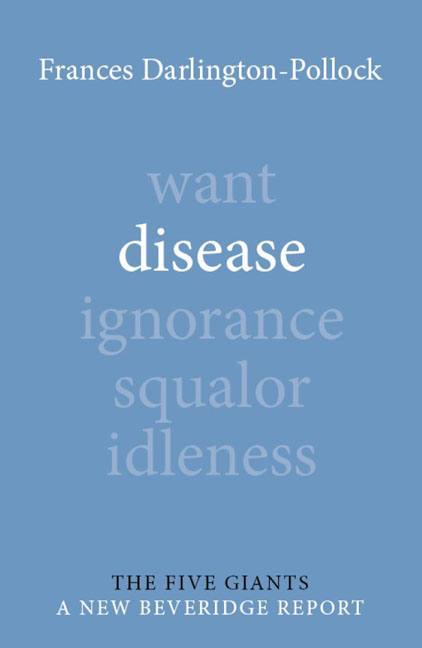Book contents
- Frontmatter
- Contents
- Acknowledgements
- 1 Introduction: A Revolutionary Moment
- 2 Disease: An Evolving Giant
- 3 Unequal Health and the Behemoth of Today
- 4 From Cradle …
- 5 … to Grave: The Problem of Age
- 6 Inequity and Inferiority: A Dismantled Health and Social Care Service
- 7 Continuing Challenges, Contemporary Crises
- 8 Shoring up “Assumption B”
- References
- Index
8 - Shoring up “Assumption B”
Published online by Cambridge University Press: 20 January 2024
- Frontmatter
- Contents
- Acknowledgements
- 1 Introduction: A Revolutionary Moment
- 2 Disease: An Evolving Giant
- 3 Unequal Health and the Behemoth of Today
- 4 From Cradle …
- 5 … to Grave: The Problem of Age
- 6 Inequity and Inferiority: A Dismantled Health and Social Care Service
- 7 Continuing Challenges, Contemporary Crises
- 8 Shoring up “Assumption B”
- References
- Index
Summary
November 2022 marks 80 years since Beveridge's landmark report appeared. His proposals capitalized on the spirit of a population ravaged by war that was ready to work together to secure improved labour standards, economic advancement and social security for all. He was explicit in the importance of universality, refusing to be drawn by “sectional interests” and advocating for what truly was revolutionary. Rebuilding the country after the war was going to require an interlocking attack on all five giants. The report's “Assumption B” – that there would be a comprehensive national health service for all – underpinned the whole endeavour. But what of Assumption B today?
In 1942, the leading cause of death was “Other Myocardial Degeneration” (as defined by the International Classification of Disease). In other words, heart disease. It accounted for 8.1 per cent of all male deaths and 10.6 per cent of all female deaths. Cardiovascular health more broadly – other diseases of the heart and of blood vessels – accounted for an additional 8.8 per cent and 7.3 per cent of deaths for males and females, respectively. Among the remaining top ten leading causes of death were respiratory diseases such as bronchopneumonia and tuberculosis, strokes and cancers of the stomach for men and breast for women. Heart disease, lung disease and cancer remain global killers. But the giant of Disease evolved and so must our attack on it. Table 8.1 unpacks in more detail just how different that attack might need to be, comparing leading causes of death by age group and gender in 1942 and 2020. The burden of mental health is acutely visible in the prominence of suicide as a leading cause of death for younger ages today, but that is just the tip of the iceberg. And, were we interrogating data from 2019, for example, the toll of dementias in particular, but also cancers and heart disease, would also be visible. But more striking, given that once assumed transition through the age of receding pandemics, is the cost of Covid-19 in accounting for 12.9 per cent of all male deaths and 10.3 per cent of all female deaths.
There can be no greater signal for the need for change than the impact of a global pandemic in which millions lost their lives. But a revolution is needed when so many of those deaths were because of the toxicity of the social structures which characterize contemporary British society.
- Type
- Chapter
- Information
- Disease , pp. 121 - 138Publisher: Agenda PublishingPrint publication year: 2022



